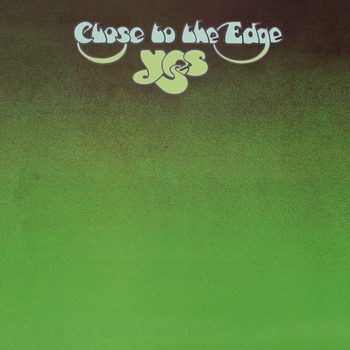
Close to the Edge is the fifth studio album by Progressive Rock group Yes, released on September 13, 1972. The album was recorded over a very slow process after finishing up production on Fragile, having recorded such complex arrangements with their rehearsals that they were forgotten the next day—drummer Bill Bruford said that the title of the album was reflective of the state of the band at the time. As a matter of fact, the laborious process of the recording sessions was such that Bruford left for King Crimson just after they released the album, and before they went on tour to support it. It still was a major commercial success, reaching top five albums charts positions in the United States, UK and the Netherlands, and is currently certified Platinum by the RIAA in the United States. "And You and I" was released as the supporting single.
Tracklist:
Side One
- "Close to the Edge" (18:42)
- "The Solid Time of Change" (6:04)
- "Total Mass Retain" (2:25)
- "I Get Up, I Get Down" (5:43)
- "Seasons of Man" (4:30)
Side Two
- "And You and I" (10:09)
- "Cord of Life" (3:47)
- "Eclipse" (2:29)
- "The Preacher, the Teacher" (3:10)
- "Apocalypse" (0:42)
- "Siberian Khatru" (8:55)
Principal members:
- Jon Anderson - lead vocals
- Bill Bruford - drums, percussion
- Steve Howe - guitars, backing vocals
- Chris Squire - bass, backing vocals
- Rick Wakeman - keyboards
And you and I looked over lists of endless tropes:
- Bookends: "Close to the Edge" begins and ends with the same nature sounds.
- Triumphant Reprise: "Seasons of Man", the final movement of "Close to the Edge", is musically similar to the first movement, "The Solid Time of Change".
- Concept Album: The album could perhaps be considered one. According to Jon Anderson, the entire album is inspired by Hermann Hesse's Siddhartha. Due to the Word Salad Lyrics, though, it's highly questionable whether anyone other than Anderson understands the concept.
- Design Student's Orgasm: The inside cover art, a Roger Dean painting of a lake on a mountaintop.
- Epic Instrumental Opener: Probably the band's most famous example; the first movement of "Close to the Edge", "The Solid Time of Change" lacks lyrics for its first four minutes, aside from some wordless chanting from Jon Anderson.
- Epic Rocking: 39 minutes long, three songs, one side-long, two taking up the other. However, if every section of every song is counted as individual, then only "The Solid Time of Change" and "Siberian Khatru" qualify, making "Siberian Khatru" an odd case of being Longest Song Goes Last being played straight and inverted at the same time.
- Gratuitous Foreign Language: Jon Anderson had no idea what "Khatru" (as in "Siberian Khatru") meant until he asked someone to look it up.note
- Holy Pipe Organ: "I Get Up, I Get Down" features a solo on the pipe organ at St Giles-without-Cripplegate
 .
. - Intercourse with You: "And You and I", at least "Cord of Life"—though it's more about the joy of procreation than simple sex.
- Longest Song Goes First: Not only is the side-long suite "Close to the Edge" is the opening track, its opening movement is also the longest of them.
- Minimalistic Cover Art: Just the title and band name at the top over a black-to-green gradient (though the inside cover is a Roger Dean artwork that is not minimalistic).
- Miniscule Rocking: "Apocalypse", the final section from "And You and I", only lasts 0:42.
- Non-Appearing Title: "Siberian Khatru".
- Protest Song: "And You and I" was called "The Protest Song" when it was being written, as revealed before several performances documented in Progeny. The song is a commentary on how political leaders have consistently failed humanity's ideals and how very little seems to change.
- Shout-Out:
- "And You and I" is loosely inspired by Isaac Asimov's Foundation Series; in particular, the "mutant enemy" is inspired by the Mule.
- "Close to the Edge" is inspired by Hermann Hesse's Siddhartha.
